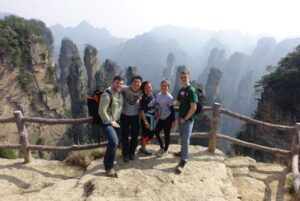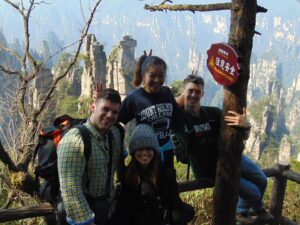Going Home to China


Imagine yourself growing up in a world where only half of you is represented. Imagine yourself not being accepted into either racial/social/ethnic categories that you represent. Imagine being able to visibly tell the difference between yourself and everyone else around you with a quick glance around the room. This, along with many other feelings, are the common daily thoughts and acknowledgements of not only transatlantic adoptees, but also first generation transatlantic individuals. Growing up with these thoughts throughout one’s life makes it all the more difficult for people to go back to their origins, making even the thought of returning to their “motherland” difficult. Especially for me, going back to China was hard not only because of the feelings of going back to the place where I was adopted from, but also because of how it felt looking “normal” or like everyone else. For the first time, I didn’t feel like I was physically different, and though it was relieving and reassuring at first, over time the differences became much more apparent and were not what I expected.
The Beginning
21 years ago, based on speculation and research, I was born into a very poor family in a small village in Shaoyang, Hunan, China. Not much else is known, other than the fact that I was placed upon the steps of a vocational high school one day, delivered to the closest police station, and put into an orphanage and a foster home within a week. Furthermore, within two months I was put up for adoption and taken in by a wonderful, amazing, and loving American family, who would give me the blessings and privilege of what it is like to live in an American household. Other facts based on speculation on my childhood could be that I, along with many Chinese female babies, was stolen by other family members or neighbors, in the attempt to either try for a baby boy or to increase the government stipends that were given based on the boy-girl ratio of the town. As I was found at 3 months old in very good and healthy conditions, this last stated fact could very much be a serious possibility, as some of the highest kidnappings happened in my birth province. Whatever the case is, all I know for a fact is that I am 100% better off with the family I have, not not only because of the opportunities I have here for a better and brighter future, but also because of the ability to return back to my home country, province, and hometown to discover more of who I am.
Going Home

Twenty years later, I returned to my home country and culture, not really knowing what to expect or what to do. It was hard for two reasons: one because I was visiting my home culture and finding myself through the chaos of studying abroad, and two because I was Chinese American in a Chinese world. It was shocking at first. I didn’t understand why they looked at me like I had two heads; I was amused when they swooned over my Caucasian and Hispanic friends and completely ignored me. It was, in the beginning, nice to be completely invisible from the world and sink into my music, not worried if anyone would bother me. But behind all of this were the expectations that were demanded from Asian Americans. We were frowned upon if we wore the same clothing as our Caucasian friends. We, myself along as the other Asian Americans in my study abroad group, found it harder to explain to the Chinese natives that our Chinese wasn’t fluent, and why we were adopted. Some people pitied us, thinking we weren’t wanted by our birth families and somehow they failed us, and some people just ignored us and treated us like we were just ignorant Americans. If something happened, it was okay for the “white Americans” to do something about it, but not if you were an Asian American. There were many times where the Chinese citizens handed me the camera and asked me to take the photos of them and the foreigners, or completely ignored me in the face of other, more “intriguing” people.
Not American, Not Chinese

Everything was fine at first, but what was hard in the beginning was the double expectations. It became harder to tolerate when the disparities between the other students and myself became more apparent and larger. It especially became difficult the more and more I became homesick, wishing for clean air, my parents, my boyfriend, and the comforts of gender equality. I was not being treated the way that a woman in America would be treated, but also not the way that a white woman would be treated in China. There was a large gap, and it was uncomfortable, but I had to acknowledge the privilege I had as a person who was able to grow up in America. Either immigrating to America or being raised there because of the hard struggles of my parents, it was an enlightening feeling to know how lucky I truly was to grow up in the United States. Traveling around China, people thought that I was my friend’s translator, or they were truly confused when I wasn’t able to respond to them fluently. They stared at me, not knowing if I was Chinese or American. During my experience travelling abroad, I was the true epitome of the intersections between both cultures.
Going back to China was the most rewarding thing I have done to date. Through the difficulties that I had being an Asian American in China and searching for my heritage and where I came from, I have learned so much about myself, my culture, and gained a true appreciation for what I was given as a child. If I had the opportunity to go back to Shanghai, China to study abroad, I would without a doubt. My travels back to China enriched my cultural awareness, pushed my language abilities further than any of my Caucasian friends, and gave me the ability to experience what my life would be like if I had not been adopted. I was able to experience both worlds, and create a greater appreciation of what I have here in the United States.
If you want to learn more about what it was like for me to go back to my hometown, Shaoyang City in Hunan Province, check out my YouTube video I created last semester for my IFSA Ambassador project!
https://www.youtube.com/watch?v=E3uFTTLLCM8
Caitlyn Favreau was an International Studies major at Mt. Holyoke University and studied abroad with IFSA on the International Business in China program in Shanghai, China in Spring 2015. She served as an alumni ambassador for IFSA.